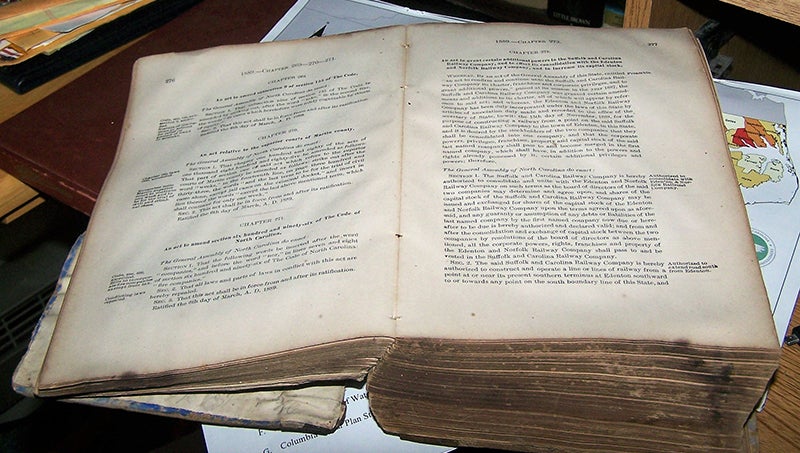Old law book reveals Tyrrell history tidbits
Published 10:34 am Tuesday, July 28, 2020

- Laws and Resolutions of the 1889 North Carolina General Assembly survived water damage and 131 years of use and neglect to yield a wealth of information about Tyrrell County. (R. McClees photo)
|
Getting your Trinity Audio player ready...
|
An 1,119 page volume of the laws and resolutions passed by the North Carolina General Assembly in 1889 surfaced recently, and it contains some interesting information about Tyrrell County.
The Governor was Daniel W. Fowle of Wake County, and the Lieutenant Governor was Thomas M. Holt of Alamance County.
William N. H. Smith of Raleigh was Chief Justice; the Superior Court Judge for our district was George H. Brown Jr. of Washington, and the Solicitor [district attorney] was Jonathan H. Blount of Hertford.
Our Senators were W. H. Lucas of Middleton in Hyde County and Harry W. Stubbs of Williamston in Martin County.
Our Representative was David Alexander of Bay [Post Office] in Tyrrell County.
Nine laws were passed specifically affecting Tyrrell County:
Chapter 11: That B. Jones, sheriff of the county of Tyrrell, and R. W. Smith, sheriff of the county of Dare, be allowed until the first day of April, A.D. 1889, to settle the State taxes of their respective counties. Ratified 23 Jan. 1889.
Chapter 63: An act to amend chapter 265 of the laws of 1887 in relation to the public roads in Tyrrell County. It struck out section three of that law, but no explanation of its intent was given. Ratified 5 Feb. 1889. The 1887 law gives a glimpse into road maintenance here 133 years ago, and it is quoted below:
“CHAPTER 265.
“All act to modify the road law to far as applicable to Tyrrell county.
“Section 1. That it shall be lawful for the board of supervisors of public roads of Columbia township, Tyrrell county, to exempt from working on the public roads of said township the hands or citizens residing iu Scotia and Mills Ridge neighborhoods in said township, so long as they shall keep in proper condition the roads leading from said neighborhoods out to the public road.
“Sec. 2. All persons liable to work on the public roads of Kilkenny and New Lake neighborhoods in Tyrrell county shall be subject to perform as many as ten days’ work in any one year on their respective roads if the overseer shall find it necessary in order to put and keep his road in proper order.
“Sec. 3. No person shall be required to haul dirt or wood for the construction or repair of any public road in said county unless he shall own or have control of such horse, mule or other beast of burden as shall be necessary for that purpose; but a day’s work of a horse or mule and cart shall be equal to one day’s work of a man, and shall be allowed as such.”
Chapter 90 of the 1889 Public Laws made it a misdemeanor to buy or sell corn in the ear or shelled of less quantity then five bushels between sunset and sunrise. In prosecutions it was only necessary for the State to prove that defendant bought or received the corn, “and the burden shall be upon the defendant to show that the provisions of this act have been commplied with.” The law applied only to Tyrrell and nine other eastern counties. Ratified Feb. 18, 1889.
Chapter 101: “That it shall be unlawful for any person to set any weir or fish-net, or any other obstruction that prevents the passage of fish, within one-fourth of a mile of the mouth of Frying Pan creek, or in the Frying Pan creek from the mouth of said creek up to a point known a Jarmin’s Point, at the two pines and low cypress, in the county of Tyrrell.” Violation was a misdemeanor punishable at discretion of the court. Ratified Feb. 13, 1889.
(More laws pertaining to Tyrrell County will be described in a later report.)

